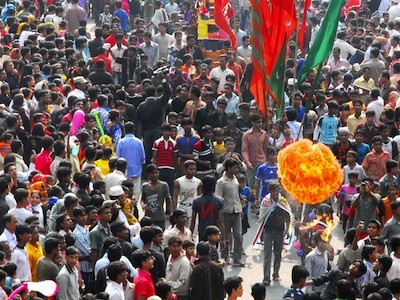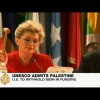Stories about Religion from December, 2011
Racism in Malaysia
The Human Rights Foundation has drafted a report about the extent of institutional racism in Malaysia.
Brazil: Anti-Homophobia Bill Suffers a “Death Blow”
Brazilian lawyer Thiago Fiago comments on [pt] the recent changes to the bill PLC122, which originally intended to criminalize homophobia. Fiago says the proposed bill has suffered a “death blow” and criticizes the role of religion, and particularly evangelical representatives, in the parliament.
India: Photo Essay On Kumara Shasthi
Anu Shankarn at A Wondering Mind posts a photo essay on Kumara Shasthi, highlighting the legends of lord Karthikeya.
Egypt/Libya: Questions on Minorities Freedom After the Revolution
Various recent attacks on freedom of religion in Egypt and Libya, countries which ousted their dictators this year, have raised questions among netizens. Tarek Amr reports.
Trinidad & Tobago: Celebrating Christmas
Outlish offers some advice on what not to say if you're “liming” in Trinidad and Tobago for Christmas.
St. Lucia: Poetic Preaching
Caribbean Book Blog profiles a local priest who “has just published a book of narrative prose and poetry”, which he describes as ” a Caribbean-centric “theological reflection on the social, historical, economic, religious, political, and national consciousness.”
Ashura Commemorations Around the World
Muharram, the first month of the Islamic calendar, is a period of mourning for Shia Muslims. Events reach a climax on Ashura, the tenth day of the month. Ayesha Saldanha reports on Ashura commemorations around the world.
World: “Faithbook”, a Project Against Religious Intolerance
Two young “faith-trotters” Anne-Laure and Frederic launched “faithbook” [fr], a project that will take them across the world to meet similar pro-peace initiatives. They look to start a dialogue between people of faith who believe in peaceful coexistence through initiatives in various domains such as sports, education, culture and environment. They will shortly...
African Bloggers React To UNESCO's Admission Of Palestine
The admission of Palestine as a full member of UNESCO on 31 October 2011 has prompted an intense debate, with people taking very different stands. Africans from the continent as well as the diaspora have also taken an active part in the debate online. However, whether they agreed or disagreed with Palestine's admission to UNESCO, the different sides have often projected the debate onto the internal problems of their own countries.
Caribbean: Thoughts on World AIDS Day
December 1, was World AIDS Day. Bloggers from the Caribbean have weighed in with their own thoughts about and support for the ongoing battle against HIV and AIDS.



